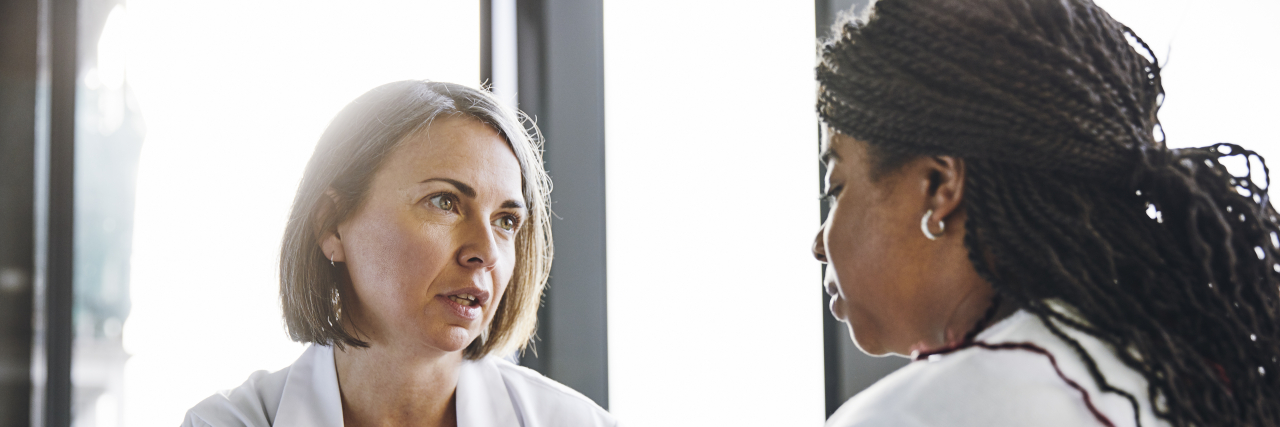'This Is Not MS' -- How Four Words Changed My Life With a Rare Disease
Nine years and three neurologists — this is what it took to get my diagnosis correct. I experienced dizziness and pain in my eye, was unsteady on my feet, and lost hearing in one ear. I have neuromyelitis optica spectrum disorder (NMOSD) — a rare, lifelong, and debilitating autoimmune disease of the central nervous system that primarily damages the optic nerve(s) and spinal cord. But for nine years, my life was at risk because of an incorrect diagnosis of multiple sclerosis (MS). I tried numerous — often painful — therapies to treat a condition I did not have.
During those nine years, my life did not stop. I got married, and we had two boys. We bought a home, started and left jobs, and went about the business of building our lives together. So, by the time I met my third, and current, neurologist, I was wholly unprepared for the words he would utter: “This is not MS.” But I wouldn’t have heard those words at all if I hadn’t taken control of my own health.
Two months prior to the consultation that would change everything, my brother encouraged us to find a new neurologist. He didn’t think my previous neurologist was treating me, the patient; rather, he was treating the MS, a diagnosis we believed might not even be accurate. My health was deteriorating, and my medications were not helping. I was having trouble understanding the results of my MRIs and why the sight in one of my eyes had not yet returned.
I decided my brother was right: my doctor and I were not effectively communicating. After ongoing conversations, my family and I felt we needed a doctor who was involved in clinical research, because it was clear that what I was facing was something uncommon. I had heard a neurologist speak who I thought might be a good choice. We looked the doctor up and he was involved in clinical research. We contacted the office and were told there was a month’s wait for an appointment. That wait was extremely hard, but I knew it was a step in the correct direction.
Prior to our initial meeting, my current neurologist thoroughly reviewed all of my MRIs and my entire medical history. During our meeting, he encouraged our questions and answered them honestly. He explained his findings — and what he believed — in a way I could finally understand. And those four words, “this is not MS,” would forever change the path of my treatment.
Communication with your doctor is key. If your doctor is talking to you and you don’t know the words or terminology, ask the doctor to stop and explain. This is your body: know what is going on. Restate the doctor’s words using your own and confirm you are understanding correctly. It is easy to feel intimidated during an appointment with an expert, but remember, you are the expert on your body. You know how it feels and what is happening with it on a daily basis.
For example, I was once told to “learn my veins.” At first, I thought that was odd advice. How could I possibly learn my veins when there are so many and I’m not even in the medical field? I began studying the veins in my arms and hands daily and researching vein health. Understanding my body helped the nurses find the best vein with the least discomfort. I felt empowered by taking part in my own health care process, which encouraged me to start advocating for myself and people like me in other ways.
It wasn’t until I started sharing my story that I realized I was able to help others in similar situations. Living with a rare disease can sometimes feel isolating, and meeting others who live with rare diseases creates a unique bond. That bond can offer tremendous support and resources as similar treatments and experiences are shared. I knew advocating for myself was not enough and I didn’t want others to go through what I had.
I discovered The Sumaira Foundation (TSF), whose mission is to bring light and hope to people living with NMOSD through research and a community of support. I became TSF’s Ambassador for Arizona and fundraised until COVID hit. Then there was another need. People with NMOSD were feeling isolated, so TSF created the Human Collective Project (HCP), which allows anyone impacted by NMOSD to meet in a safe space, discuss anything, and share their stories.
I was also able to take my advocacy to Capitol Hill during a Rare Disease Week event. I met virtually with senators and shared my experience with NMOSD. I was able to speak about the need for awareness about NMOSD and other rare conditions and to help others not experience a delay in diagnosis and treatment, as I did.
My advocacy work has given me a purpose beyond this condition. I know that the more people hear about NMOSD, the less it will be unknown. And maybe others will not have to endure nearly a decade before being correctly diagnosed and treated.
Taking charge of your health gives you a voice in all aspects of your care. It gives you back something you may have lost with your disease. It offers a feeling of control in a situation that too often can make you feel you have none.
For those newly diagnosed, don’t give up! Don’t be afraid to get involved and ask questions. The more you know, the more empowered you will feel. And no one — and nothing — can take that away from you.
Getty image by The Good Brigade.

